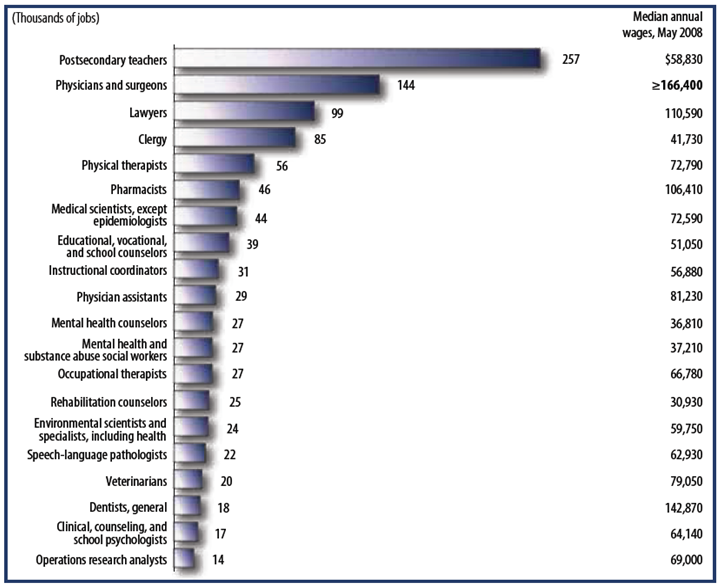First Professional Degree Programs

What is a First Professional Degree?
First professional degree is though an academic degree; but with a syllabus that is crafted for enabling the students for a meticulous occupation or line of work, segments where intellectual research and School/College/University related activities is not the profession, however it focuses more on occupations including:
- Law
- Medicine
- Dentistry
- Optometry
- Pharmacy
- Social work
- Accounting
- Engineering
- Religious ministry
- Education
The First Professional Degree Program degree enhances your skills to increase your earning power in these and many more occupations but not academics. Not, that academic field does not help you to earn, but these are professions- which are away from education segment. Once the degree accomplishment is done the school/college/university is not a part of your life except…REUNIONS…
The prerequisites and norms tend to differ in various parts of the country. Usually professional degree attainment happens to be a process for nearly all the careers including law and medicine which are carried out only for undergraduates and post-university professional courses which in any case do not yield you educational degrees. These degrees may be awarded at two stages or attainments; graduate or undergraduate. At a graduate stage, they are usually awarded as a "professional doctorate" degree or generally a professional master's degree. Usually the programs which lead to a professional degree are linked – directly or indirectly to fields or occupations regulated by government up to certain extent. An example is of a professional degree in the field of religion, medicine, engineering or law, which directly or indirectly have its own impact on the nation or the country.
There are also some professions with a different view. They might consider the first professional degree to be one more jewel in the crown leading to a successful career for that particular occupation – skill set. On attaining the regular academic degree and of course the first professional degree, individuals may carry on their studies to practice an advanced professional degree and a terminal academic degree also at times. The professional proficiency is enhanced on attainment of every degree, helping the student with improved ability to prove their caliber in the field of expertise.
In a way the demand of the profession plays a major role where the First Professional degree serves and is accordingly considered as a terminal academic degree. These are the instances where no further enhancement of knowledge or experience is foreseen for the student. In such cases first professional degree covers up and takes care of the practical aspects of the talent based work including segments of internship and also the prerequisites which need formal schooling.
Individuals are advised to do appropriate First Professional Degrees assessment with regards to the eligibility criteria for specific professional degree programs. It is so because these programs focus more on practical approach; which is not the case in academic degrees. Usually, counselors of accredited schools/universities and colleges may provide accurate and appropriate details leading to the successful completion of the degree program. online undergraduate degree programs or professional degree studies have always proved their worth.
The question here that might arise in the mind of a lot of individuals; Why should and would one go for a professional degree and not an academic graduate degree or vice versa? What is the difference between a Professional Degree Vs Master’s Degree?
| Graduate or Master's Degree | Professional Degrees |
| Graduate academic degree programs comprise of advanced studies in an educational segment | Graduate professional degree programs comprise of advanced studies in occupational or vocational segments |
| The main focus is on enhancing the knowledge of a subject matter and not specifically on the application of skills towards professional execution | Exactly opposite; along with strong theoretical knowledge individuals also need primary but strong skills for practical application in professional execution |
| Master's degree programs in this segment may be either terminal in nature or at times may also provide an prologue towards research and further studies at the doctoral level | Professional Master's degree programs are usually terminal in nature. |
| These programs stress more on theoretical skills and are not mostly designed as preparation for professional careers. | There might be instances where they serve the purpose of preparing individuals for further studies at the doctoral level, but usually they are not designed for this purpose |
| Graduate degree programs in academics leading to Doctorate often includes research; preparing graduate student for path of scholarship in educational field | Even the doctorate studies in this segment are inclined towards practicals, to an extent it prepares the student to train or supervise others in the segment, for exploring new skills through practical approach in the field, or to prepare individuals with regards to the selected profession |
| Enlisted are the degrees accordingly awarded on successful completion of academic graduate program: | Enlisted are the degrees accordingly awarded on successful completion of a professionally oriented graduate program: |
Academic Graduate Programs:
| Master of Arts (A.M. or M.A.) | Master of Philosophy (M.Phil.) |
| Master of Science (M.S.) | Doctor of Philosophy (Ph.D.) |
Professionally Oriented Graduate Programs:
| Bachelor of Divinity (B.D.) | Master of Professional Studies (M.P.S.) | Doctor of Library Science (L.S.D.) |
| Bachelor of Laws (LL.B.) | Master of Public Administration (M.P.A.) | Doctor of Medical Science (Med. Sc.D.) |
| Master of Architecture (M.Arch.) | Master of Public Health (M.P.H.) | Doctor of Medicine (M.D.) |
| Master of Arts in Teaching (M.A.T.) | Master of Regional Planning (M.R.P.) | Doctor of Ministry (D.Min.) |
| Master of Business Administration (M.B.A.) | Master of Religious Education (M.R.E.) | Doctor of Musical Arts (D.M.A.) |
| Master of Comparative Jurisprudence (M.C.J.) | Master of Sacred Music (S.M.M.) | Doctor of Nursing Practice (D.N.P.) |
| Master of Comparative Law (M.C.L.) | Master of Sacred Theology (S.T.M.) | Doctor of Nursing Science (D.N.S.) |
| Master of Divinity (M.Div.) | Master of Science for Teachers (M.S.T.) | Doctor of Optometry (O.D.) |
| Master of Education (Ed.M. or M.Ed.) | Master of Science in Education (M.S. in Ed.) | Doctor of Osteopathic Medicine (D.O.) |
| Master of Engineering (M.E.) | Master of Science in Pharmacy (M.S. in Pharm.) | Doctor of Pharmacy (Pharm.D.) |
| Master of Fine Arts (M.F.A.) | Master of Social Science (M.S.Sc.) | Doctor of Physical Therapy (D.P.T.) |
| Master of Food Science (M.F.S.) | Master of Social Work (M.S.W.) | Doctor of Podiatric Medicine (D.P.M.) |
| Master of Forestry (M.F.) | Master of Theology (Th.M.) | Doctor of Professional Studies (D.P.S.) |
| Master of Health Administration (M.H.A.) | Master of Urban Planning (M.U.P.) | Doctor of Psychology (Psy.D.) |
| Master of Hebrew Literature (M.H.L.) | Doctor of Arts (D.A.) | Doctor of Public Administration (D.P.A.) |
| Master of Industrial and Labor Relations (M.I.L.R.) | Doctor of Audiology (Au.D.) | Doctor of Public Health (D.P.H.) |
| Master of Industrial Design (M.I.D.) | Doctor of Chiropractic (D.C.) | Doctor of Religious Education (D.R.E.) |
| Master of International Affairs (M.I.A.) | Doctor of Dental Surgery (D.D.S.) | Doctor of Sacred Music (S.M.D.) |
| Master of Landscape Architecture (M.L.A.) | Doctor of Education (Ed.D.) | Doctor of Science in Veterinary Medicine (D.Sc. in V.M.) |
| Master of Laws (LL.M.) | Doctor of Engineering (D.Eng.) | Doctor of Social Science (D.S.Sc.) |
| Master of Library Science (M.L.S.) | Doctor of Engineering Science (Eng.Sc.D.) | Doctor of Social Welfare (D.S.W.) |
| Master of Management in Hospitality (M.M.H.) | Doctor of Hebrew Literature (D.H.L.) | Doctor of the Science of Law (J.S.D.) |
| Master of Music (Mus.M.) | Doctor of Juridical Science (S.J.D.) | Doctor of Theology (Th.D.) |
| Master of Nutritional Science (M.N.S.) | Doctor of Law (J.D.) | Doctor of Veterinary Medicine (D.V.M.) |
| Master of Physical Therapy (M.P.T.) |
Careers
Top colleges for first professional degrees or best online schools for professional degree courses usually prepare individuals towards the practical aspects of a particular or a selected career option. Successful completion of a curriculum for a study program; mandatory for individuals in order to step in a particular occupation; is called a professional degree. Usually when one thinks of a professional degree the professions in medicine and law are on top priority. There is nothing wrong with the logic as it is mandatory for doctor’s to graduate with an M.D., and a lawyer to attain a degree in law and there by clearing the bar exam. But there are many more that are been offered at various stages on study in varied fields of expertise.
These professional degrees can be attained at the master's level, bachelor's level and at associate’s level as well. Few of the professional degrees need doctorate level education also. There are usually a few prerequisites to be fulfilled in order to enter the professions even post attainment of a professional degree. It may be clearing a particular examination or successful completion of enhanced trainings for acquiring approved licenses.
To know which definite degrees are taken into consideration as professional degrees may help individuals in a better way to determine their professional goal. Usually the ones with a need of a lot of education, a doctoral degree prominently, includes medicine, veterinary medicine, osteopathy, law and alike. Few of the master's level professional degrees may include social work, physical therapy, counseling, nursing and alike.
Time dedication and finances are on top in the list of reasons of stress. Hence students have now started seeking professional degrees which can enable them to initiate careers instantly and without more of the education; which are usually in demand and good paymasters as well.
One may also come across some segments where varied levels of preparation or certification might be available; however the one which needs the maximum education results in to a professional degree. Classic example can be of registered nurses. An individual can attain nursing as a degree at an associate's level and then at bachelor's level; hence in this instance bachelor's degree is meant to be the Professional stage or degree. The second reason to quote nursing as an example is that it also fulfils the needs of clearing an exam to get a license to practice and at the same time also is necessary for the practitioners to accomplish continuing education periodically throughout their careers.
Projections: 2008-18

Occupations with most jobs and which typically need a First Professional Degree.
Fact till date remains that that median wages of professional degree holders are more as compared to other degree holders:
Full-time, year-round workers